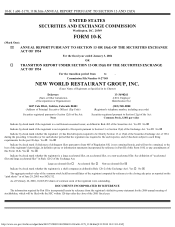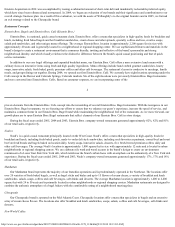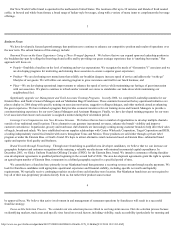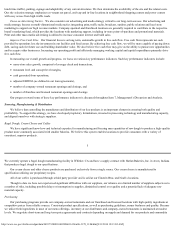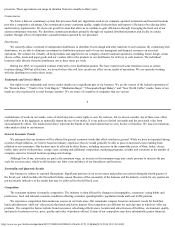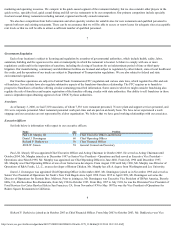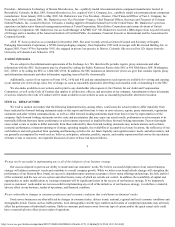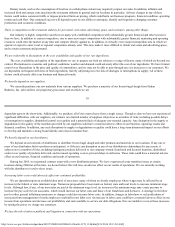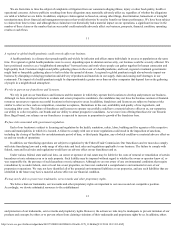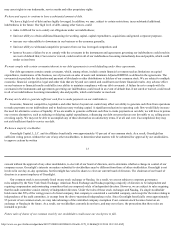Einstein Bros 2005 Annual Report Download - page 9
Download and view the complete annual report
Please find page 9 of the 2005 Einstein Bros annual report below. You can navigate through the pages in the report by either clicking on the pages listed below, or by using the keyword search tool below to find specific information within the annual report.
http://www.sec.gov/Archives/edgar/data/949373/000110465906016136/a06-3178_110k.htm[9/11/2014 10:13:03 AM]
Dietary trends, such as the consumption of food low in carbohydrate content may negatively impact our sales. In addition, inflation and
increased food and energy costs may harm the restaurant industry in general and our locations in particular. Adverse changes in any of these
factors could reduce consumer traffic or impose practical limits on pricing, which could harm our business prospects, financial condition, operating
results and cash flow. Our continued success will depend in part on our ability to anticipate, identify and respond to changing consumer
preferences and economic conditions.
There is competition in the restaurant industry for personnel, real estate, advertising space, and customers, among other things.
Our industry is highly competitive and there are many well-established competitors with substantially greater financial and other resources
than we have. In addition to current competitors, one or more new major competitors with substantially greater financial, marketing and operating
resources could enter the market at any time and compete directly against us. In addition, in virtually every major metropolitan area in which we
operate or expect to enter, local or regional competitors already exist. This may make it more difficult to obtain real estate and advertising space,
and to retain customers and personnel.
We are vulnerable to fluctuations in the cost, availability and quality of our raw ingredients.
The cost, availability and quality of the ingredients we use to prepare our food are subject to a range of factors, many of which are beyond our
control. Fluctuations in economic and political conditions, weather and demand could adversely affect the cost of our ingredients. We have limited
control over fluctuations in the price and quality of commodities, and we may not be able to pass through any cost increases to our customers. We
are dependent on frequent deliveries of fresh ingredients, thereby subjecting us to the risk of shortages or interruptions in supply. All of these
factors could adversely affect our business and financial results.
We heavily depend on our suppliers.
We currently purchase our raw materials from various suppliers. We purchase a majority of our frozen bagel dough from Harlan
Bakeries, Inc. (who utilizes our proprietary processes) and on which we are
10
dependent upon in the short-term. Additionally, we purchase all of our cream cheese from a single source. Though to date we have not experienced
significant difficulties with our suppliers, our reliance on a limited number of suppliers subjects us to a number of risks, including possible delays
or interruption in supplies, diminished control over quality and a potential lack of adequate raw material capacity. Any disruption in the supply or
degradation in the quality of the materials provided by our suppliers could have a material adverse effect on our business, operating results and
financial condition. In addition, any such disruptions in supply or degradations in quality could have a long-term detrimental impact on our efforts
to develop and maintain a strong brand identity and a loyal consumer base.
We heavily depend on our distributors.
We depend on our network of distributors to distribute frozen bagel dough and other products and materials to our locations. If any one or
more of our distributors fails to perform as anticipated, or if there is any disruption in any of our distribution relationships for any reason, it
subjects us to a number of risks, including inadequate products delivered to our company-owned, franchised and licensed locations, diminished
control over quality of products delivered, and increased operating costs to prevent delays in deliveries. These risks could have a material adverse
effect on our business, financial condition and results of operations.
During late 2005, we negotiated contract terms with a new distribution partner. We have experienced some transition issues at certain
locations during 2006 but at this time, we do not believe this will have an adverse effect on our results of operations. We are currently working
with this distributor to resolve these issues.
Increasing labor costs could adversely affect our continued profitability.
We are dependent upon an available labor pool of associates, many of whom are hourly employees whose wages may be affected by an
increase in the federal or state minimum wage. Numerous proposals have been made on federal, state and local levels to increase minimum wage
levels. Although few, if any, of our associates are paid at the minimum wage level, an increase in the minimum wage may create pressure to
increase the pay scale for our associates, which would increase our labor costs and those of our franchisees and licensees. A shortage in the labor
pool or other general inflationary pressures or changes could also increase labor costs. In addition, changes in labor laws or reclassifications of
associates from management to hourly employees could affect our labor cost. An increase in labor costs could have a material adverse effect on our
income from operations and decrease our profitability and cash available to service our debt obligations if we are unable to recover these increases
by raising the prices we charge our customers.
We face the risk of adverse publicity and litigation in connection with our operations.

